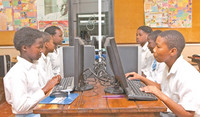
THEY may attend school in the isolated countryside of Dwesa, far from the technology associated with big cities, but Wild Coast children and their teachers are connected to the world, thanks to Rhodes University's Siyakhula Living Lab project.
Started in 2006, the multimillion-rand project now benefits 17 schools, all of which are a mouse click away from all the knowledge offered on the internet. "The project has grown into a broadband island," says award-winning Rhodes University professor Alfredo Terzoli, who heads up the Telkom Centre of Excellence in the university's computer science department.
Terzoli said the schools were connected to the internet via satellite, while WiMax distributed the signal. "The important thing is that they have high-speed connectivity that allows video links between schools and they can share resources like Wikipedia and electronic posts.
"Only three schools have a 20-seat computer lab and can run a class, while the others have just one computer, but at least they have connectivity and one computer is better than nothing. The next step is to grow this infrastructure, hopefully with the help of government."
Terzoli said although the connectivity was restricted to schools, community members were welcome to use the technology, and the idea was to make people in rural areas feel as if they were joined with other communities socially, culturally and economically through technology.
"What we hear is that a lot of parents want to send their children to schools in the city, and although in practice a few computers won't change this, they can make people feel that they are not at the bottom of the barrel and that their children do not have to move away from deep rural areas."
This week Sivakhula Living Lab - the first word is Xhosa for "growth" — celebrated its success at Dwesa Junior Secondary School with a ceremony which included members of the Mbhashe Municipality, traditional leaders and government officials.
"The ceremony was to welcome the 12 latest schools into the project and to celebrate its expansion thanks to Saab Grintek technologies, which sponsored the connection of these schools," Terzoli said.
He won the 2012 Department of Trade and Industry technology award in the human resource development category. He said the Dwesa "living lab" pilot project should be unfolded countrywide.
"We would like to get national government on our side so this can be rolled out to all rural and pen-urban areas, because even most townships are off-limits for fixed telecommunications. Our plan is huge, but in practice it is still small."
Caption: WELL CONNECTED: School children in Dwesa at the computer workstations which form part of Rhodes University's Siyakhula Living Lab project
By: Barbara Hollands
Source: WEEKEND POST (Sunrise)
